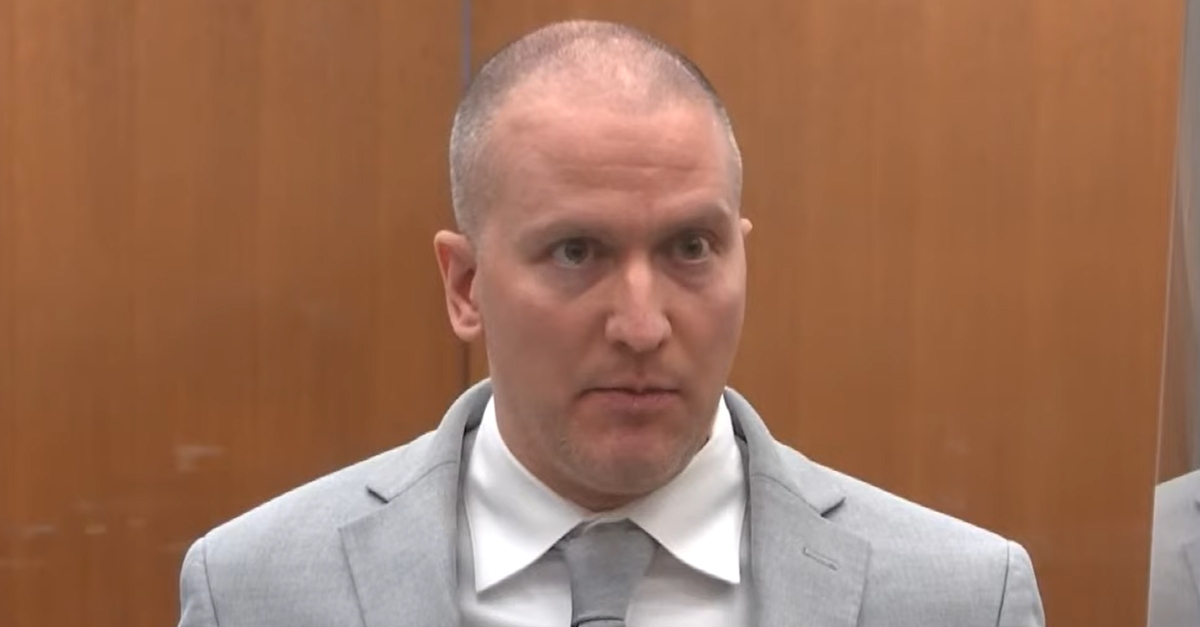
Derek Chauvin appears at his June 25, 2021 sentencing hearing in district court. The proceeding was carried live on the Law&Crime Network.
Convicted murderer Derek Chauvin on Thursday filed documents with the State Court of Appeals in an attempt to flip his conviction in the death of George Floyd, Jr. The documents contain Chauvin’s name alone and not the name of an attorney. He indicated recently that he was “unrepresented by legal counsel in connection with the appeal,” CBS News reported.
Chauvin recently filed separate papers in district court requesting to proceed in forma pauperis. (That’s the legal term for being too poor to pay the usual filing fees required in connection with a case.) Judge Peter Cahill on Thursday agreed that Chauvin’s claims were “not frivolous” and that the defendant was “financially unable to pay any fees.”
The nine-page appellate document, titled simply as a “statement of the case of appellate,” is half devoted to a point-by-point factual and legal synopsis of precisely how Chauvin was prosecuted. It then launches into a veritable laundry list of complaints about how the case unfolded.
(1) The District Court abused its discretion when it denied Appellant’s motion for change of venue or a new trial;
(2) The District Court abused its discretion when it denied Appellant’s motion for a continuance or a new trial;
(3) The District Court abused its discretion when it denied Appellant’s motions to sequester the jury throughout trial;
(4) The State committed prejudicial prosecutorial misconduct;
(5) The District Court prejudicially erred when it concluded that the testimony of Morries Hall, or in the alternative Mr. Hall’s statements to law enforcement, did not fall under Minn. R. Evid. 804(b)(3) and was not a violation Appellant’s constitutional confrontation rights;
(6) The District Court prejudicially erred when it permitted the State to present cumulative evidence with respect to use of force;
(7) The District Court abused its discretion when it ordered the State to lead witnesses on direct examination;
(8) The District Court abused its discretion when it failed to make an official record of the numerous sidebar conferences that occurred during trials;
(9) The District Court abused its discretion when it failed to allow Appellant to exercise several cause strikes for clearly biased jurors during voir dire;
(10) The District Court abused its discretion when it permitted the State of amend its complaint to add the charge of third-degree murder;
(11) The District Court abused its discretion when it strictly limited and undercut the admissibility of George Floyd’s May 6, 2019 arrest;
(12) The District Court abused its discretion when it submitted instructions to the jury that materially misstated the law;
(13) The District Court abused its discretion when it by denying Appellant’s motion for a Schwartz hearing;
(l4) The District Court abused its discretion when it denied Appellant’s post-verdict motion for a new trial due to juror misconduct.
Chauvin appears not to have heeded the old lawyer’s adage: when filing an appeal, don’t try to make every argument; try to make the best argument. Appellate courts rarely agree that most or all of the decisions which led to a conviction were erroneous. Or, put another way, appellate judges are disinclined to think that trial judges are completely incompetent.
The document suggests a “formal brief” will be filed at a later date.
According to CBS News, Chauvin says a public defender refused to take his case. He’s appealing that denial to the Minnesota Supreme Court. The Police Officers Federation of Minneapolis is no longer paying for Chauvin’s defense because he was convicted, CBS added.
Attorney Eric J. Nelson represented Chauvin during his state criminal prosecution. Nelson also represents Chauvin in a separate federal civil rights case.
Nelson has been the subject of several district court documents which sought payment for services rendered during prior appeals on issues filed in the middle of the original case. Those so-called “interlocutory appeals” questioned whether third-degree murder charges could be reinstated against Chauvin and whether Chuavin could be tried separately from his three co-defendants. Judge Cahill awarded $5,000 in fees to Nelson subject to both requests. By so doing, Cahill pointed out that under Minnesota law, when the state loses a motion before a trial judge and subsequently seeks an interlocutory appeal, attorney’s fees for the defendant “must be paid by the governmental unit responsible for the prosecution.”
Chauvin was charged on May 29, 2020, with two counts: third-degree murder and second-degree manslaughter. Prosecutors charged him on June 30, 2020, with second-degree unintentional murder during the commission of an underlying felony. The underlying felony was third-degree assault. Third-degree assault is an assault which “inflicts substantial bodily harm.”
Chauvin was convicted; he was sentenced on June 25, 2021, to 270 months in prison.
Chauvin and his wife divorced shortly after Floyd’s death. A judge subsequently questioned whether Chauvin was trying to hide his assets by giving nearly everything to his wife in what was described as an “uncontested” divorce. The couple also faced a subsequent prosecution for allegedly failing to file their taxes.
Read the appellate documents below:
[image via the Law&Crime Network]